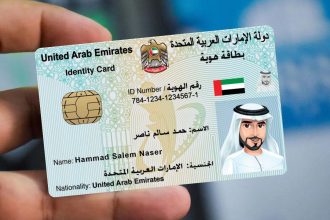What is Article 51 of the UAE Traffic Law? Driving in the UAE requires adherence to strict traffic regulations designed to ensure the safety and order of roadways. For individuals residing or visiting the UAE, it is essential to hold a valid driver’s license before operating any vehicle. The UAE’s commitment to road safety and order is reflected in its legislation, particularly in Article 51 of the Federal Law No. 21 of 1995 on Traffic, which addresses the penalties for driving without a valid license. Violating this article can result in significant fines, imprisonment, and other consequences that can impact a driver’s future.
- What is Article 51 of the UAE Traffic Law?
- Why Is Article 51 Important?
- How to Obtain a Driver’s License in the UAE
- 1. Meet Eligibility Requirements
- 2. Enroll in a Driving School
- 3. Pass the Theory Test
- 4. Complete Practical Training
- 5. Pass the Road Test
- Consequences of Driving Without a Valid License in the UAE
- Importance of Renewal and Verification
- Additional Violations Related to Driving Without a Valid License
- Conclusion
What is Article 51 of the UAE Traffic Law?
Federal Law No. 21 of 1995 on Traffic, commonly referred to as the UAE Traffic Law, sets the foundational rules and regulations governing all aspects of road usage, from obtaining a license to penalties for violations. Article 51 of this law specifically highlights the consequences for individuals who are caught driving without a valid driver’s license.
According to Article 51, any individual found driving without a valid driver’s license in the UAE could face severe consequences, including:
- Imprisonment for up to three months
- A fine of at least AED 5,000
These measures emphasize the UAE’s zero-tolerance policy toward unlicensed driving, highlighting the importance of holding a valid driving license at all times.
| Penalty | Description |
|---|---|
| Imprisonment | Up to three months for driving without a valid driver’s license |
| Fine | A minimum fine of AED 5,000 imposed on offenders |
Why Is Article 51 Important?
The UAE’s roads are busy, with residents and tourists alike using vehicles as a primary means of transport. Ensuring that all drivers are licensed promotes accountability and ensures that everyone on the road has received adequate training and has the knowledge to drive safely. Article 51 serves several crucial purposes:
- Promoting Public Safety: Licensed drivers have undergone tests that certify their understanding of road signs, traffic rules, and defensive driving skills.
- Reducing Traffic Violations and Accidents: Licensed drivers are generally less likely to commit violations, leading to fewer accidents and a more orderly traffic system.
- Upholding Legal Accountability: When drivers are licensed, authorities can effectively enforce traffic laws and hold individuals accountable for any violations.
How to Obtain a Driver’s License in the UAE
For those planning to drive in the UAE, obtaining a valid driver’s license is straightforward but requires meeting specific requirements. Below is a general guide on how to acquire a driver’s license in the UAE:
1. Meet Eligibility Requirements
The minimum age requirement for applying for a driver’s license varies based on vehicle type:
- Motorcycle and small vehicle license: Minimum age is 17 years
- Car license (light vehicle): Minimum age is 18 years
- Heavy vehicle license: Minimum age is 20 years
2. Enroll in a Driving School
Applicants must enroll in a licensed driving school to undergo training. The UAE has various reputable driving schools where individuals can take both theoretical and practical lessons.
3. Pass the Theory Test
The theory test includes questions about road signs, traffic rules, and safe driving practices, ensuring applicants have a foundational understanding of traffic laws.
4. Complete Practical Training
Practical lessons cover the skills needed to operate a vehicle safely. The number of training hours may vary based on prior driving experience.
5. Pass the Road Test
The final road test assesses the applicant’s ability to drive safely in real traffic conditions.
Consequences of Driving Without a Valid License in the UAE
Driving without a valid license in the UAE is considered a major violation. The following are the primary consequences under Article 51 of the UAE Traffic Law:
1. Imprisonment
The law mandates that offenders could face up to three months of imprisonment for driving without a valid license. This severe penalty serves as a deterrent, emphasizing the importance the UAE places on road safety.
2. Fines
Offenders may also be subject to a fine of AED 5,000 or more. This financial penalty is significant and reflects the government’s strict stance on ensuring that all drivers are licensed.
| Violation | Penalty Type | Amount |
|---|---|---|
| Driving without a valid license | Fine | Minimum AED 5,000 |
| Driving without a valid license | Imprisonment | Up to three months |
Importance of Renewal and Verification
Even with a driver’s license, it is essential to ensure it remains valid. Driving with an expired license can also lead to fines and other penalties, and the process for renewal is straightforward:
- Renewal Period: Licenses must be renewed every two to ten years, depending on the holder’s residency status.
- Documentation Required: Renewal typically requires personal identification documents, a current license, and an eye test report.
Additional Violations Related to Driving Without a Valid License
In addition to the consequences outlined in Article 51, drivers who are found without a valid license may also incur other penalties. These could include vehicle impoundment, particularly for repeated offenses.
| Scenario | Potential Consequence |
|---|---|
| First-time offense | AED 5,000 fine and possible imprisonment |
| Repeated offense | Higher fines, potential vehicle impoundment, and mandatory court appearances |
Conclusion
The UAE’s dedication to safety is evident in its stringent enforcement of the traffic laws, particularly Article 51. By ensuring that all drivers possess a valid license, the government prioritizes safety and the reduction of road accidents. For anyone living or visiting the UAE, understanding and respecting traffic laws is not only essential for personal safety but also reflects responsible citizenship.










